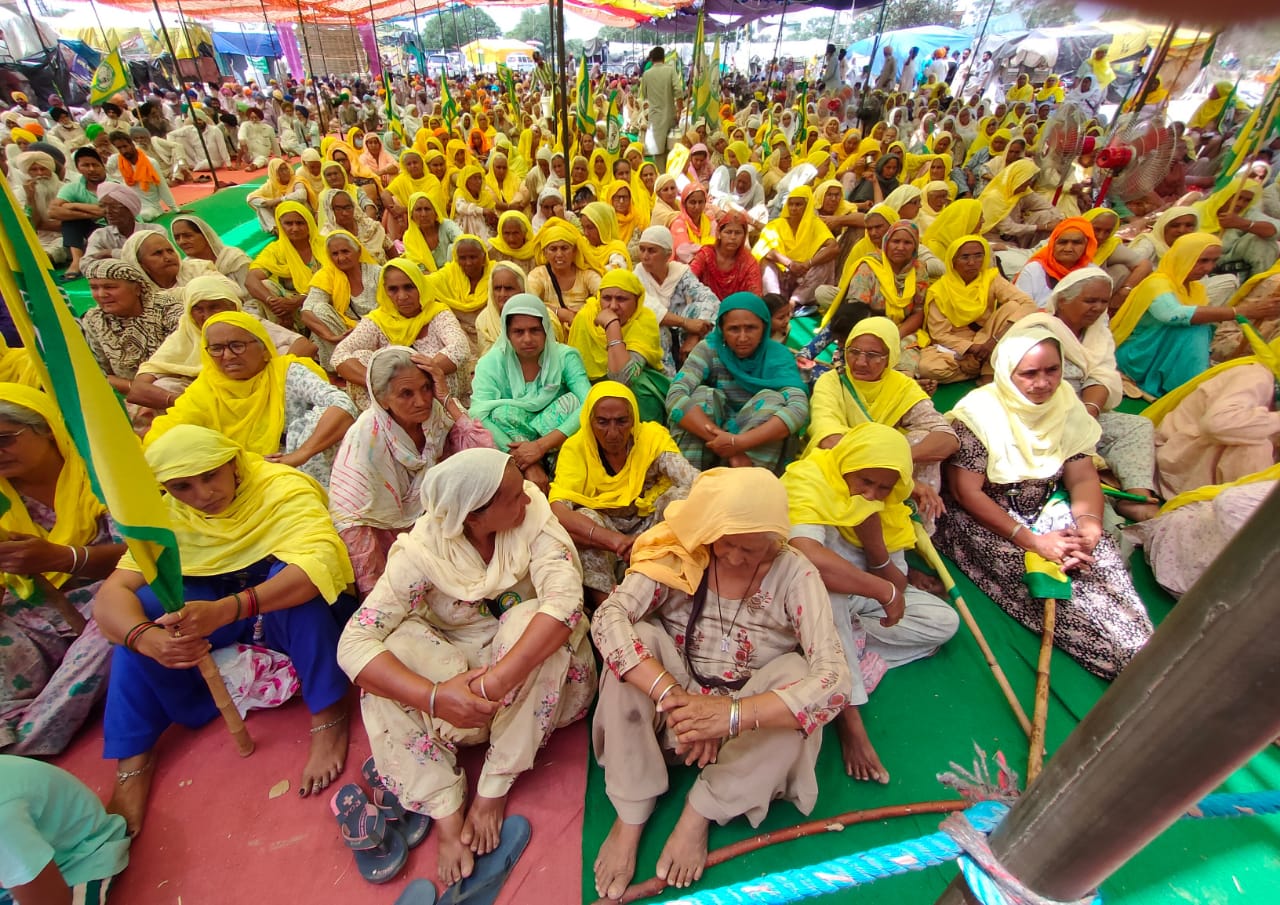Baisakhi at Tikri border: Colours of celebration & patriotism
Beside the dusty road at Pakoda Chowk crossing, Bahadurgarh, near Tikri border, a group of middle-aged men can be seen preparing for a wrestling match to be held this evening. About 15-20 young men and teenagers are busy arranging chairs, music system and preparing the mud ground for the sports activities. Some others can be seen decorating tents and tractors with flowers and trinkets. It is not an ordinary day for the thousands of farmers protesting at the Tikri border today. It is the occasion of the annual Baisakhi festival, the spring harvest festival, celebrated with great enthusiasm in Punjab and northern parts of India.
“Today is a special day. Today is our day. We have decided to celebrate Baisakhi here just the way we used to celebrate it in our villages. We will play games, watch films and celebrate it with enthusiasm. I will participate in rassa-kheench (tug of war). It has been years but I am sure I can still perform. I have thought of who all will be in my team,” says Harwinder Singh, a 65-year-old farmer from Sangrur district in Punjab. Singh has been sitting at the Tikri border for the last four months.
Singh, along with six other farmers of his age, talks about activities as part of the Baisakhi Mela (fair) at the Tikri border.
The Five Rivers Heart Association, in collaboration with Punjab Wrestling Association, is organising a sports event to celebrate Baisakhi with farmers, at the Tikri border. Gatka (Sikh martial arts), cricket, wrestling (mud), kabbadi (an Indian team sport), bodybuilding, horse racing, athletics, turban tying competition, volleyball and various games will be held.
As one moves ahead and walks along the line of tractors, tents and langar camps at the border, the overwhelming aroma of fritters, kheer (a type of dessert), jalebis (a deep fried sweet) fills the atmosphere. Long queues of men, women and children, protesting farmers, as well as the locals, wait with glasses and plates in their hands for sweets, savouries and cold drinks.
“Langar is also serving special food today like ice cream and jalebi. Baisakhi is a farmers’ festival and farmers are the ones who feed the world. That is why langar is open to all and on this special day, all passers-by and everyone who comes here should have a little bit of sweet. It is pious,” explains Baldev Singh, a 45-year-old farmer from Kamalpura village in Punjab.
When asked about the intense summers, the afternoon’s scorching sun and the condition, Singh explains that the farmers are used to living and working in the fields even during extreme weathers. “We are not bothered. We are used to extreme weather and we are able to manage here too. We have put fans and coolers for older people and children, but most of us do not need it. We will manage to stay put,” he says.
Just a few steps from the langar service camp, one can hear some speeches, slogans and patriotic songs being sung on the main stage area, about 500 metres from the main road. About 600 farmers, all dressed up in yellow and saffron attires, especially on the occasion of Baisakhi, sit under a large tent in front of the stage, on which, various local performers, singers as well as farmers themselves sing and deliver speeches. Women farmers of all ages, many of them above the age of 70, occupy the front rows, followed by the men.
The huge, enthusiastic crowd cheers and applauds the performers on stage as they play songs linked to Baisakhi as well as remember the martyrs of the Jallianwala Bagh incident, which took place on April 13, 1919, in Amritsar.
“This year marks 102 years of the Jallianwala Bagh incident and we remember the martyrs through songs here. Apart from them, over 300 farmers have also lost their lives during the protest at different borders of Delhi. We also consider them martyrs who sacrificed their lives for the cause and remember them with equal respect,” says Sukhbir Singh, a 66-year-old farmer from Ludhiana, Punjab who was busy preparing and practising the poetry he wrote and is next in line to perform.
Three others farmers also wait behind the stage to perform. One of them, a 78-years-old Gudiya Devi, with a walking stick in her hand, says that she will perform on stage after almost 50 years. She has been with the protestors at the Tikri border for over six months and says she is still hopeful of the Modi government repealing the three farm laws.
“There are so many people here. I do not know what others say but I have only witnessed the number of protesters increasing here. We have survived the bitter cold and we will manage to survive this summer too. We will go back only when the farm laws are repealed and I am sure I will see that happening in this life,” she says.










